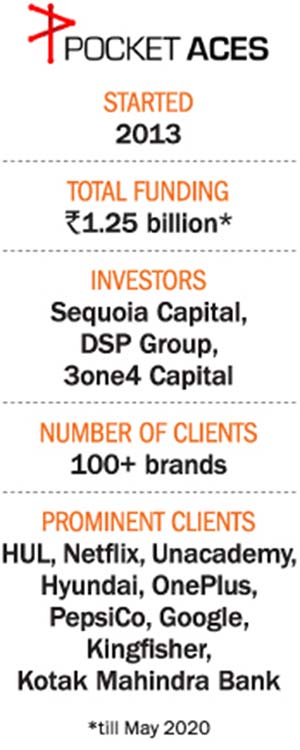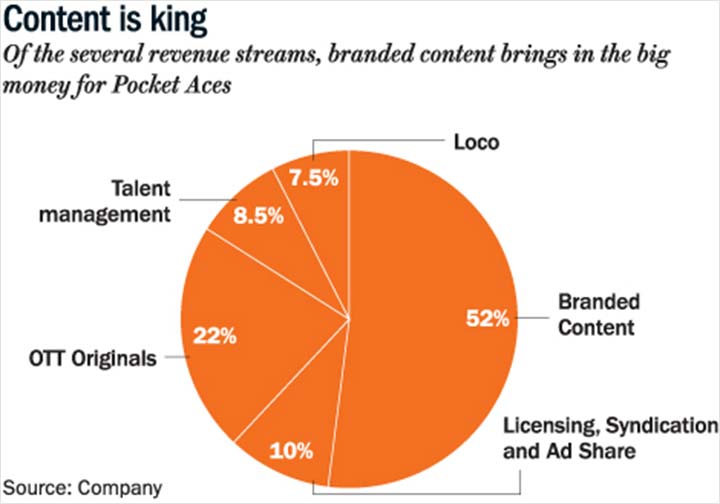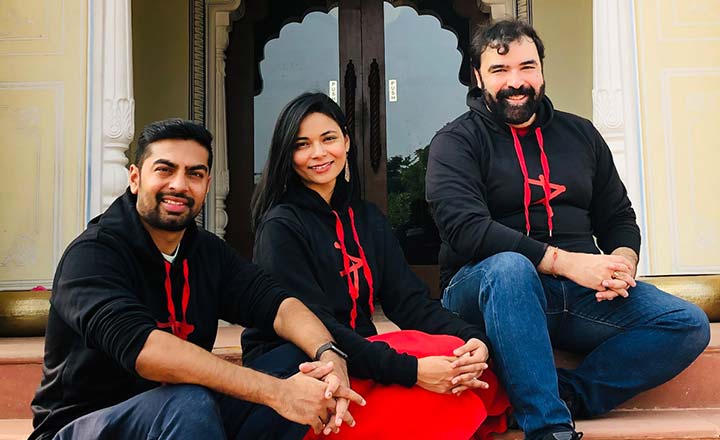
If you are someone who cracks up to relatable videos and are consumed by viral content, lying in your bed in the middle of the night, there’s a solid chance you have seen a video from the house of Pocket Aces. The seven-year-old digital entertainment start-up, with backing from investors including Sequoia Capital and 3one4 Capital, has taken the internet by storm. Producing content across six channels – namely Gobble, FilterCopy, Loco, Dice Media, Nutshell and Jambo, the start-up’s aim is to “solve boredom for the millions of Indians online.”
Its growth has been remarkable. In an ecosystem where the likes of ScoopWhoop, The Viral Fever (TVF) were already present, the Mumbai-based company has shown a 4x jump in revenue from Rs.80 million in FY18 to Rs.330 million in FY19. Their massive video network clocks over a billion views every month. The start-up is also in a space that is growing rapidly. “Demand for content and entertainment is being fuelled by low data cost and smartphones, and this sector will continue to grow at 22-25% annually for the next three years,” says Gopa Kumar, COO, Isobar India, a digital agency that is part of Dentsu Aegis Network.
Banker brigade
The co-founders, Anirudh Pandita, Ashwin Suresh and Aditi Shrivastava, won their spurs on Wall Street. Suresh’s passion had always been the movies, so he was taking classes and collaborating for film festivals even in 2008 in New York. Usually investment bankers like him have little time to breathe, but that was the year of the subprime meltdown. He had a job but also many free hours. The banking assignment dragged on for a while, and in 2011, he made his big career move. He took a job at Reliance Entertainment, producing movies. Two years later, he had set up Junglee Pictures for the Times Group.
He could have taken it easy but audience expectation was fast changing. Young people, with high speed internet, were watching international shows. They had little patience for family dramas or dated college romances. Suresh knew that he had to catch up, which could happen only in a smaller company, where stories don’t turn stale from layers of decision making. He caught up with Pandita (his college mate) and Shrivastava (his girlfriend, and now wife) and the three decided to create content.
The three were already familiar with taking measured steps and watching the bottom-line. They did the same at their start-up. Along with making videos and putting them up on FilterCopy, they also decided that their stories would evolve from the feedback of viewers. That strategy has been retained even now. Whatever resonates with the audience is developed into long-form for Dice Media (>10 minutes, such as web series) or used as grist for their advertising mill. They also let content creators see how the audience is responding to their stories, through metrics on how long a viewer stays with a story or how fast a viewer shares that story. Now, which writer wouldn’t want to know that?
Content everywhere
Pocket Aces’ other channels are for specific interests, that is, Gobble for lifestyle and food (who doesn’t like that), Nutshell for trivia and explainers (to help the young sound smart during water cooler conversations) and Jambo for the Next Billion Users, with short-form animated content targeted at Tier-II and III towns in the Hindi speaking belt. Loco is their interactive gaming platform that hosts live quiz shows and games.

About 52% of the revenue comes in from branded content - (See: Content is king). This small company today has an enviable list of clients, such as PepsiCo, Flipkart, Amazon, Samsung, One Plus, Google, Kingfisher, Kotak Mahindra Bank. But, winning the first client wasn’t easy. Shrivastava recalls that it was an e-commerce platform selling jewellery called VelvetCase. It was a long campaign done at a fraction of the fee the start-up charges now. “It was probably what we would charge for a video and a half on FilterCopy today,” she says.
An advertising campaign executed more recently, Operation MBBS, for the booming edtech start-up Unacademy is now becoming a full-fledged web series. It chronicles the lives of three first-year students in one of India's top medical colleges. “We designed the campaign with deliberate goals in mind - building brand awareness, encouraging first-time trials of the app, showcasing repeat usage and retention, and finally driving subscriptions via the series,” says Shrivastava. Pocket Aces’ large distribution ensured a wide reach for the series, agrees Karan Shroff, vice president – marketing, Unacademy. Sounds like a perfect marriage between a quill and the till!
But their storytelling genius has been displayed best with Little Things, a show that now has a third season running on Netflix. In 2016, it began as short videos of a couple, Kavya and Dhruv. The first two were ‘Annoying things boyfriends do’ and ‘Confusing things girlfriends say’, and were shared on YouTube and Facebook. Millions responded to it. It graduated into a YouTube series titled Little Things, and in 2018, Netflix bagged it. It’s a fairytale every writer dreams of but, again, the success was built on careful data collection. Suresh told the director Ruchir Arun to start the opening scene with action, and not an establishing shot. “Not because I am a creative genius who knows all that, but because I have the data,” Suresh recalled the conversation, in an interview with Gadgets 360. Creation of original content for OTTs and TV platforms is Pocket Aces’ second biggest revenue source now.
Pranav Pai of 3one4 Capital, one of the early investors in the start-up, says, “Their use of data to design content and their ability to build long-term association with their audience and brands is going to help them build a very valuable company.”
Pocket Aces’ third revenue source, the most recent one, is talent management. “This is becoming significant for us quickly. We have on boarded a lot of actors and social media influencers and we manage them as talent, getting them brand deals and casting projects,” says Shrivastava. Then there is the fourth, in content syndication. “We own the IP of everything we create and we license it across different platforms such as airlines, cabs, TV, in different languages, and even in other regions of the world,” says Shrivastava. Their content library is syndicated across platforms such as Ola Play and Jio, Emirates and Cathay Pacific, Tata Sky, and even international platforms such as China's Youku Tudou and Bytedance. The fifth income stream is ad share revenue from social media such as Facebook and YouTube. “Since we have started clocking a billion views a month, that revenue has become significant, around 10% of our total revenue,” she says.
All of this seems like such a jolly ride, but Pai of 3one4 Capital is aware of the challenge going ahead. The industry still relies on revenue from brands and advertisers, and from marketing budgets. Content, even love stories, is only to drive engagement and expand audience reach. If the advertising budget is cut, no romance can help the bottom-line. “It is still challenging to build a direct-to-consumer subscription business at scale,” he says. “We think that’s a macro risk for the entire industry at a time when there may be a global slowdown, especially this year,” he adds.
The start-up is busy making plans to go deeper into gaming with Loco. Pandita promises a new update, which will be a step towards that. Then they will dive deeper with Jambo for reaching every corner and Nutshell for reaching every office cooler. The start-up does not plan to spare any smartphone with a screen. It is, after all, aiming for your pockets.











